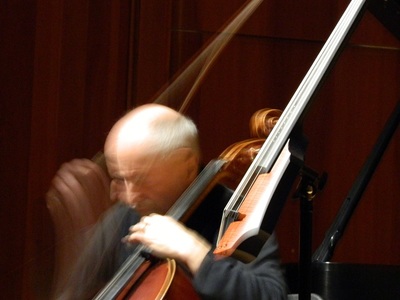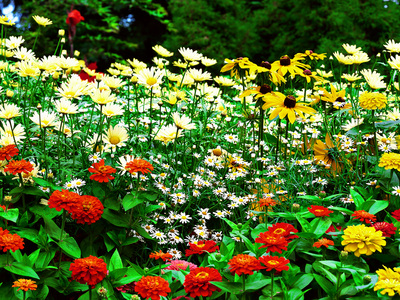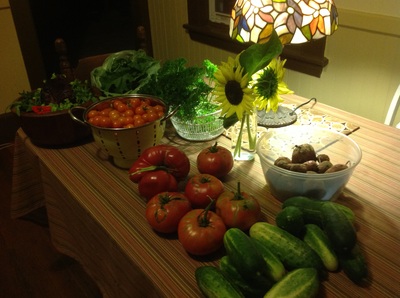|
With the proliferation of summer music camps and workshops, I thought it might be useful to spell out some of the main differences and strengths of our Vermont experiences.
The first thing is that we keep our workshops to an intimate number, fifteen maximum. From attending various workshops myself, and as a teacher hungry to tailor the material to a specific group or individual, I know that our unique experiences give us unique understandings, strengths, and shortcomings. Our Vermont workshops give individual attention in three ways: 1. private instruction; 2. masterclass-style interactions that place one player in the center of the room and opens up feedback to the group; and 3. creating space for individual voices/concerns/issues/questions due to the limited number of overall participants. The values of private instruction are self-evident: the student has direct access to a mentor in a confidential setting that can make candid technical assessments easier to swallow, and invites remedies and suggestions that are tailor made to the student. The "masterclass," (not thinking of the traditional "master" in this case, but rather conceiving of the community as the master) is a forum that is a powerful, healing and intriguing context for growing as a player and as a teacher. It's uncanny how input from a small group of new friends becomes a potent and positive experience when we're together in a creative and self-actualizing context like improvisation and creativity. We begin nearly every Vermont workshop with an evening of free improvisation. This seems to set the stage for releasing pretense, as well as adopting values of mindful presence, listening, and response-ability (the ability to respond). Of course, there's lots of detailed information too, but you're always within arms reach of someone who can clarify and demonstrate the intricacies of anything. The relatively small numbers at our workshops make providing great food possible, and we believe that food plays an important role. While I always repeat, "you are what you eat," meaning your improvs will tend to reflect the values of your listening and practice, we take pains to provide the best locally sourced ingredients prepared by our ace chef, Liz Rogers. Conversations take a different turn when you're enjoying some of the best food to be had in Vermont - or anywhere. I think there must be something about the air in Vermont too, people seem to be OK with who they are here, and are encouraged to go barefoot and lie in the grass. The sense of community that is formed over the course of a few days consistently leads to life-long friendships and collaborations. I like to think that our workshops are part of a corporate backlash in a way, we keep things personal, designed to unleash your music, to encourage your independent thinking, and to nourish your own musical communities with tools for new collaborations, sounds, and styles.
1 Comment
There’s a huge difference between how we prepare for a performance of a written “part” and how we prepare for an improvisational experience. Most of us classically-trained players are intimate with the former, so let’s talk about how to prepare for a creative opportunity that’s made up of the unpredictable and the unknown. And let’s borrow a phrase from martial arts, “training for chaos.” In this instance “chaos” refers to the area you enter beyond what you “know,” to an area that can’t be precisely foretold or controlled. (I also love the term “wild” for these real-life encounters - as in wild flowers, wildlife, and wilderness - situations where your very best is accessed naively and intuitively.) Of course, to prepare for creative musical encounters there’s a lot of useful, overlapping values from the classical world: achieving a foundation of technical ability and facility, recognizing intervals and chords (ear training), keeping steady rhythm, etc. In addition to that, improvisers develop creative relationships with their instruments and with the elements of music, for example, taking a mode and exploring the intervals and possibilities, perhaps inventing some new melodies, or picturing a colorful or distinctive interior where that mode seems most at home. Or finding a drum loop in 5/8 and becoming the world’s leading expert in jamming out with it in F# Phrygian! Our creativity is nourished by our curiosity about, and love for, colors, styles, and sounds from the world around us. And this pathway – the pathway to developing creatively in our private daily practice – is what we discuss and work on together at our summer workshops in Vermont, as well as in classes at the Berklee College of Music in Boston. But wherever your creative imagination might lead you, an incredibly enticing invitation awaits: entering the realm of the unknown where all you’ve listened to and practiced blossoms into living music. Finding your way through these wild waters, the moment of chaos, does not rely on formulas or planning – though that’s an important part of the preparation – but on the calm that comes with having navigated them before. You might call it “calmfidence,” the ability to breathe, listen and respond with fluidity when faced with a situation that is evolving with each moment. This aspect, gaining that calm confidence, can be practiced. And though there are apps that are brilliant for practicing almost any detail of music, training for chaos is best done with other musicians, in a variety of settings that challenge and nourish. A good coach can provide a series of improvisational experiences that can be structured progressively – the student will be challenged incrementally, and will succeed each step of the way. This is how it goes at our summer workshops in Vermont: engaging intensively over several days, players are given a supportive and fun environment for perceiving the intricacies of this wild musical situation, and with encouragement from a tribe of co-travelers, they move through layers of experiences that deliver enhanced confidence. Another big gain is mapping the road to increased freedom and expression. That comes with understanding more and more how chords and scales interact, how rhythmic subdivisions enliven your improvised commentary, etc. And when that becomes clear to a soul yearning for expression, then your daily practice session becomes a passionate and creative experience as you paint the colors of music on your imagination, and apply your understanding to your instrument, in your hands, in your ears. So “training for chaos” by jamming with other players in a variety of musical contexts delivers in two important ways, first by gaining confidence and calm, and second by pointing out areas where further development is desired. There's another dramatic takeaway from this kind of training: the positive effect it has on performing chamber music and solo repertoire. It's been resoundingly affirmed that gaining improvisational skill and experience brings more awareness, poise and presence to the performance of classical repertoire. More on that another time... - Eugene Friesen For more information about our summer programs in Vermont, please visit: Dear Friends,
It’s been awhile since we said hi to you all, and wow, what a year! First the news: Wendy and I are really excited about our big summer projects, namely a new cello/piano CD and our first camp here in Vermont. The new recording is with the amazing pianist Tim Ray. We have been playing together about five years now, and our CD was recorded in two days in May. The album features some beautiful choros by Brazilian composers Jacob do Bandolim, Ernesto Nazareth and Waldyr Azevedo; our version of Ravel’s “Pavane”; two pieces -- “First Ride” and “Remembering You” -- from previous and out-of-print albums; and several new compositions and improvisations. The CD sounds fantastic, recorded and mixed by Berklee’s Stephen Webber. We invite you to reserve your autographed pre-release copy! Just send an e-mail to fiddletalkvirginia@gmail.com for ordering info. As a special gift for the first five pre-orders, we will send you a cassette copy of Eugene’s first cello/piano recording, “New Friend” (now out of print). Our camp, Vermont Improvising Strings Academy (VISA), starts tomorrow, with public performances Aug. 29 and 30 in Brattleboro's Latchis 4 Theater. (More info on this site!) In January we completed recording a new Trio Globo CD, our first since 1994. Our new CD, “Steering by the Stars,” will be released this fall and includes all new compositions with some groundbreaking performances by Howard Levy on harmonica and piano and drummer Glen Velez. Stay tuned for news and mixes: http://www.myspace.com/..trioglobo. This was my first year as a full-time professor at Berklee and it was a wonderful year of teaching with some really memorable musical highlights: • Last fall Berklee produced a concert with the great Brazilian-born guitarist, composer/arranger Oscar Castro-Neves. I had the privilege of conducting the large orchestra we put together for this event, as well as playing a couple of duets with Oscar. The concert was just spectacular. Oscar has a rare gift of communication and for telegraphing his happiness and mastery through his music. And an evening of Brazilian music usually improves most everyone’s outlook! • In November, again at the Berklee Performance Center, we gave the debut of “Love Songs of the Americas,” a program featuring the wonderful Mexican singer Mili Bermejo along with her husband Dan Greenspan on bass, Tim Ray on piano, and myself. This repertoire just breaks your heart with melody and harmony but is also really engaging rhythmically. The Berklee Strings joined us in four pieces. There are a couple of excerpts from this concert on YouTube: http://www.youtube.com/watch?..v=qYZf3MTkW0U http://www.youtube.com/watch?..v=j3f4W22br68&feature=related, and plans for a CD are in the works. • In December the Berklee Jazz/World String Orchestra performed with Chris Berry, the great mbira player/drummer/singer. The concert, “African Solstice,” also featured Jamey Haddad on percussion and Dave Tronzo on electric (and eclectic) guitars. The orchestra played wonderfully well, and we enjoyed the challenge of playing Chris’s music which in some cases are direct transcriptions of complex mbira music scored out for the strings, making the group in effect one large instrument. Jamey Haddad always makes us play better: incredible groove and intelligence abound when he enters the room! Tronzo is a riveting soloist and sound-artist, he creates exotic environments and is an extraordinary listener. This concert also included the premiere of my new piece (written for Wendy) “Sapphire,” which you can experience in its entirety at: http://www.youtube.com/watch?..v=_SOe0hrSvnY Wendy and I have had some really memorable trips this year: Rio de Janeiro last August for the debut of a new CD with Brazilian harpist/vocalist Cristina Braga; Interlochen, Michigan in September for a Trio Globo residency and concert; Jacksonville, Florida in January for school shows; Kansas in March for concerts with Darol Anger and Phil Aaberg; South and North Carolina for solo shows; Oneonta, New York in April for a string clinic at SUNY; and then to NYC for Paul Winter’s 4:30AM Summer Solstice concert. For our 2009 calendar and links: http://www.eugenefriesenmusic...com/calendar.shtml Our life is very lively, sometimes exhausting, never dull, and we feel tremendously blessed to be making music with great musicians and gifted students. We thank you all for your support and interest in our music. |
Categories
All
|


